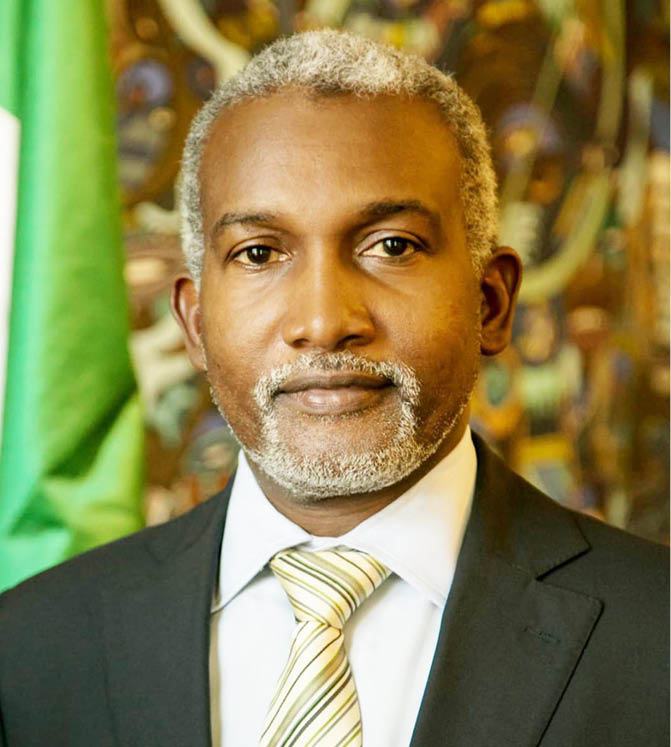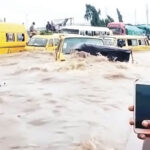Nigeria’s Ambassador to Germany, H.E. Yusuf Maitama Tuggar, in this interview with Daily Trust Saturday, speaks about the benefits of the recently commissioned Kano-Maradi rail project by President Muhammadu Buhari, Nigeria’s bilateral relationship with Germany, the country’s economic potentials, among others. Excerpt:
DT: How has it been serving as Nigeria’s ambassador to Germany?
Tuggar: Well, it’s been very interesting and it’s also been a learning process which came at a time when the world was facing many challenges; you know the most obvious is the lockdown owing to the Covid-19 pandemic which tested the concept of globalization. Many of us felt that globalization meant inter connectivity with regards to movement of goods and services and people. But the lockdown showed that globalization transcends physical movement, the movement of ideas and concepts. The world is inter connecting more than ever before, including us here in Nigeria and Africa, so it’s been very interesting.
- Uncertainty over identity of Kagara school attackers
- INTERVIEW: Why I quit banditry – Abductor of Kankara schoolboys
DT: How’s the relationship between Nigeria and Germany?
Tuggar: I have to say that the relationship between Nigeria and Germany has always been close and today it is even closer. You will recall that the German Chancellor Angela Merkel visited Nigeria and met with President Muhammadu Buhari in August 2018. Subsequently, Vice President of Nigeria, Professor Yemi Osinbajo, visited Germany in December the same year. These visits and further collaborations have given birth to significant projects and closer ties in relations. The most obvious I will say is Siemens electricity project – it’s a two billion dollars project to improve Nigeria’s transmission and distribution because we have over the years improved in generating capacity. We also have more recently the Kano-Katsina Maradi rail project.
DT: Can you further explain how the rail project started because it is little bit surprising that the Germans came in and already the work is about to start?
Tuggar: Well, the concept predates the Buhari administration. I think the project was conceived under the previous Jonathan administration. Being in Germany, I ensured that I pushed the idea of utilizing infrastructural projects to tackle the issue of migration. The embassy in Berlin did a lot of work in terms of convincing Germany that participating in infrastructural projects that will create job opportunities for the youth would curtail irregular migration. If they are provided jobs and economic sustenance, then they will have no cause to traverse the Sahara Desert, risking their lives to go to Europe. So, I identified the Kano-Maradi project as one such project because Maradi and Jibia are two nodes or nexus where migrants from different parts of Africa congregate and hand over their lives to human traffickers and smugglers to cross the desert to seek better opportunities.
So, if you have a rail project, it will first and foremost, during the construction phase, provide job opportunities, and thankfully they bought the idea.
DT: There are different interpretations to this project, with many saying it will be for the benefit of people outside Nigeria. What is your take on this?
Tuggar: It’s overly myopic to say that it is going to serve another country or that most of it is in a different country because the whole idea is to engender development. There is no country in the world today that can stand on its own, or survive without others. So, we need other countries, which is why today we have the African Continental Free Trade Agreement, which will generate more trades among African countries. If you look at what Europe and Asia are doing, they are trading much more with each other than the outside. We are not doing enough so we need to unleash that potential and this sort of project is the way to unleash that potential outside of Nigeria.
Beyond that, we have to remember that in this very country, ,2005 to be precise, under the Obasanjo administration, there was the West African Gas Pipeline project, 678 kilometre gas pipeline project that took Nigerian Gas to the Republic of Benin, Togo, and Ghana. Nobody questioned why we supply gas to Ghana when we haven’t supplied to the rest of Nigeria, we believe that it was going to benefit Nigeria. Out of that 678 kilometres, only 109 kilometres was within Nigeria, you can see in this case you had more pipeline outside Nigeria than inside. But this is not even the case of Kano-Maradi rail. If you look at it holistically, it is really Lagos-Maradi, so there is no contest there.
DT: How do you see the future of Nigeria/Germany relationship beyond these two projects?
Tuggar: I think these lighthouse projects would unleash further potentials for business, trade, investments and also with sectors that these projects affect.
DT: Nigeria is heavily indebted, especially because of the economic recession. Why do you think some companies in Germany still want to come and invest in the country?
Tuggar: Because of the huge potentials it has, it is obvious that Nigeria is the largest market in Africa and the most populous, we are 200 million people today and we are projected to be 400 in 2050. We will be the third largest in the world. Before the industrial revolution, China was the largest economy in the world but the industrial revolution allowed smaller countries to leapfrog it and end up with much-larger economies. So gradually, the world is reverting to type because we are leapfrogging and in spite of all the crises we are facing, we are going to be the third largest economy in the world.
And for those outside Nigeria, we are very self-critical, and vocal. If you go to the social media, all you see is criticism. We like to self-legislate. You remember what happened with GSM in Nigeria? We had about 500,000 telephone lines but look at us today, I think within a very short period of time we had a hundred million phone lines and it just kept growing exponentially. So that potential is there.
DT: Looking at the commentaries and criticism after the launch of Maradi-Kano project, what can you say to those sceptical about the feasibility and viability of this project?
Tuggar: They should wait and see. Minister Amaechi and many others in government have expanded the gains of this project, they have explained what it’s about, how it will benefit Nigeria. You can see how fast and efficient it’s moving from the onset. A consortium of global players will not be involved in something that is not serious. The Buhari administration is very committed towards this infrastructural project, and you can see that some of the gains are already visible. This is coming at a time when we are focusing on the Africa Continental Free Trade Agreement and so Nigeria cannot allow this to fail.
DT: Are you satisfied with the level of infrastructural development by this administration which you are a part of?
Tuggar: Well, none of us is satisfied because we know that there is room for progress and which is why we continue to make this sort of efforts. So, there is still a lot of work to be done. I am however satisfied with the commitment and drive towards improving infrastructure. I don’t think any other administration has done as much as this administration. But you have to always remember we operate a deliberative democracy.
Sometimes, there is a new policy, project or programme but one petition can cancel it or cause unnecessary delays. In a deliberative democracy, there is always the effort to carry as many people along so that no one will say their interests are not considered. This is what fundamentally slows us down.
You have to look at the fact that in smaller countries, if you impact one million farmers, that’s probably the entire agricultural sector. But if you impact one million farmers in Nigeria, it would probably not be felt. So, this is the challenge we face. But this administration is up to the task. President Muhammadu Buhari is dedicated and committed to this. He is a silent achiever who doesn’t necessarily blow his trumpet but the results are there.
DT: What is the rating of Nigerians in Germany?
Tuggar: Germans know that Nigeria is the continental power. They know that Nigeria is the economic power. They know that we are a nation full of intelligent, highly educated people. At the same time, they know that we are a nation that has poverty. We have a lot of challenges because they can see the migrants that end up in Germany unfortunately. They know that we have a youthful population, therefore we have potentials to leapfrog with technology. They know that there is rapid digital technology which is going to be the primary instrument in achieving that leapfrogging in terms of development. This is why they continue to work closely with us to develop. And they know that Nigerian businessmen and women focus more on turnover, on long-term growth of business and not just quick gains. They are aware that anywhere you go to in Africa, you will see Nigerian businesses. Look at banks for instance in Africa, there is nowhere you will go and not come across Zenith, GTBank, UBA, First Bank and so on. If you go to Namibia, you will see the likes of Sahara, they have invested in long term supply of petroleum products. Go to places like Ethiopia and other countries, you will come across Dangote and BUA, they are expanding. They are the businessmen and women in Africa. So, those with continental aspirations know that partnering with Nigeria and Nigerian businesses is the way forward.

 Join Daily Trust WhatsApp Community For Quick Access To News and Happenings Around You.
Join Daily Trust WhatsApp Community For Quick Access To News and Happenings Around You.


